|
Connection Tunnels
The Glass Bead Game
Miles Davis: Blue In Green
Tommy
Alchemical Gold
Earth
Fool's Egg
No Inside / Outside
Unconditional Love
Highlight Quotes
"I've always been mad, I know I've been mad, like the
most of us...very hard to explain why you're mad, even
if you're not mad..."
Speak To Me / Dark Side of the Moon
"You lock the door
And throw away the key
There's someone in my head but it's not me"
Brain Damage/ Dark Side of the Moon
"Actually, there is no dark side of the moon"
Eclipse / Dark Side of the Moon (and all the rest of the album lyrics)
"Hey you! Don't help them to bury the light. Don't give in without a fight. Hey you! Out there on your own, sitting naked by the phone. Would you touch me? Hey you! With your ear against the wall, waiting for someone to call out. Would you touch me? Hey you, would you help me to carry the stone? Open your heart. I'm coming home.
(But it was just a fantasy. The wall was to high, as you can see. No matter how he tried, he could not break free. And the worms ate into his brain.)"
Hey You / The Wall
"Beyond the horizon of the place we lived when we were young
In a world of magnets and miracles
Our thoughts strayed constantly and without boundary
The ringing of the division bell had begun"
High Hopes / The Division Bell
"I hear radio waves in my head."
Radio Waves / Radio KAOS
"The inner world Barrett sought to map was paradoxically surrealistic and vague or literal and
pin-point precise in its
descriptions. The songs were peopled with the archetypes of his subconscious, called forth in
various guises, such as
Barrett's 'Scarecrow'. The duality extends to the very quality of the sounds used to evoke this
world; mellotrons, plaintive
acoustic guitars, piano, disonnant sound effects, string instruments, garbled voices floating in the
background. Mirroring the
disorienting effects of LSD, Barrett's songs called forth images of both the infinite reaches of
space, with its multiplictity of
unknown worlds, or the immediately familiar surroundings of his childhood home at 183 Hills
Road in Cambridge.
In a very few years, Barrett traversed a vast expanse of territory in a relentless quest for musical
and lyrical exploration.
The combined pressures of sudden fame, excess ingestion of mind altering chemicals, and the
onset of a nervous
breakdown led to Barrett's dismissal from the band in early 1968. With his replacement, Barrett's
teenage friend David
Gilmour, Pink Floyd achieved world renown, selling countless millions of albums and playing
live in stadia the world over.
After two erratic yet brilliant solo albums, 'The Madcap Laughs' in 1969 and the eponymous
'Barrett' in 1970, Barrett
renounced music and retired to his childhood home of Cambridge. Since 1974, he has lived in
seclusion, shedding his
nickname 'Syd' along with all the trappings of pop fame."
An excerpt from the forthcoming book
"Lost in the Woods" by
Julian Palacios.
|
|
Highlight
 I find the lyrics of Dark Side of the Moon uplifting, despite the superficial appearance of
cynicism, pessimism, etc. I feel
there is great power unleashed in facing the reality of our existensial predicament- gazing into the
great yawning maw of
infinity that dwarfs our souls with its bright magnificence- understanding with the mind the
minds own limitations, and its
finite ability to make sense out of the chaos of our situation.
The experience of Syd Barrett's
breakdown, like the deaths of
other rockers, (Brian Jones and Sid Viscious for example), seem to have deepened the lyrics of
their companions who
continue on.
I find the lyrics of Dark Side of the Moon uplifting, despite the superficial appearance of
cynicism, pessimism, etc. I feel
there is great power unleashed in facing the reality of our existensial predicament- gazing into the
great yawning maw of
infinity that dwarfs our souls with its bright magnificence- understanding with the mind the
minds own limitations, and its
finite ability to make sense out of the chaos of our situation.
The experience of Syd Barrett's
breakdown, like the deaths of
other rockers, (Brian Jones and Sid Viscious for example), seem to have deepened the lyrics of
their companions who
continue on.
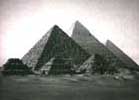 Deeper
Deeper
Music seems to me to be one of the least harmful uses of modern technology. Pink Floyd were
one of the first highly
successful groups to unleash the power of electronic music.Their sustained popularity, and their
unflagging lyrical and
musical inspiration, show that they have touched a deep chord of the modern mind. Their
explorations of the themes of
madness/ drugs/ surrealism/ death/ futility/ etc have kept their songwriting from degenerating
into the repetitive formula lyrics
that have become the rule for popular music.
Follow Ups
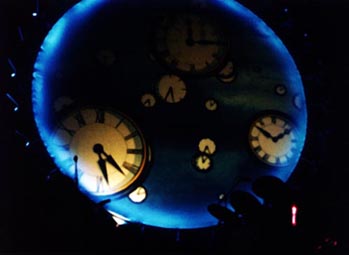
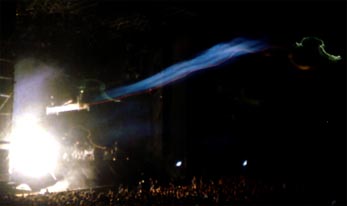
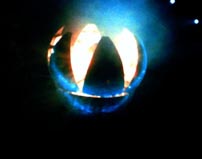
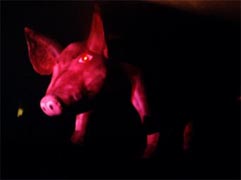
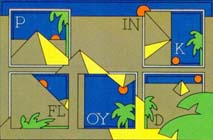

On January 16, 1997, James Bovay submitted "The Wizard of Oz." There was not enough time to make it a full move by the close of Game One on January 17th. I am adding the bulk of the text of the submission here so that players can contemplate the miriad of non-linear connections as well as the specific connections it suggests within the inner game.
Robert C. Cohen GM Game One.
The Wizard of Oz: In Dorothy's transition to Oz, her friends from Kansas undergo metamorphoses, a physical transformation specifically in which the "outside" physical state changes to symbolize "inner" conditions (eg Ovid, Kafka, Woolf's _Orlando_ etc.). Furthermore
all of Oz can likewise be seen as a place where all inner fantasy is externalized.
Links:
1. Madness: "The Dark Side of the Rainbow" (Move 28) - a new fad which has brought Floyd's classic album back to the record charts. The album and the movie are played simultaneously with surprising results. [Begin "Dark Side of the Moon" at the end of the third roar by the MGM lion. Dorthy falls off fence to "Balanced on the biggest wave, you race towards and early grave." The tornado scene plays to the wailing of "Great Gig in the Sky." "Money" begins just as the movie goes to color and munchkins dance to the guitar solos. The witch appears on the line "Black, black, black." Dorthy bangs on the tin man's chest as the heartbeat sound of the album fades out at the end. And much more. - r.c.c.]
This brings us rather easily to the next link,
2.Synchronicity (Move 36) - Some say that Roger Waters of Pink Floyd personally orchestrated the correlations between Oz and DSOTM. [Or is it synchronicity? - r.c.c.]
3.Alchemical Gold
Frank Baum's original volume was a Populist allegory. The Scarecrow was a symbol
of the Grange organizations (farmers' groups), the Cowardly Lion- T.R., The Tin Man- the silver standard, and the Yellow Brick Road as the Populists' ultimate goal, the Gold standard.
-- James Bovay
|

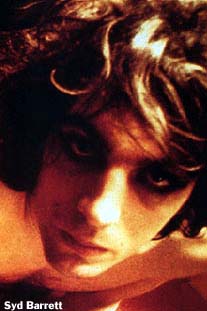



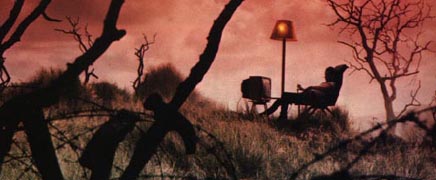
 I find the lyrics of Dark Side of the Moon uplifting, despite the superficial appearance of
cynicism, pessimism, etc. I feel
there is great power unleashed in facing the reality of our existensial predicament- gazing into the
great yawning maw of
infinity that dwarfs our souls with its bright magnificence- understanding with the mind the
minds own limitations, and its
finite ability to make sense out of the chaos of our situation.
The experience of Syd Barrett's
breakdown, like the deaths of
other rockers, (Brian Jones and Sid Viscious for example), seem to have deepened the lyrics of
their companions who
continue on.
I find the lyrics of Dark Side of the Moon uplifting, despite the superficial appearance of
cynicism, pessimism, etc. I feel
there is great power unleashed in facing the reality of our existensial predicament- gazing into the
great yawning maw of
infinity that dwarfs our souls with its bright magnificence- understanding with the mind the
minds own limitations, and its
finite ability to make sense out of the chaos of our situation.
The experience of Syd Barrett's
breakdown, like the deaths of
other rockers, (Brian Jones and Sid Viscious for example), seem to have deepened the lyrics of
their companions who
continue on.
 Deeper
Deeper





